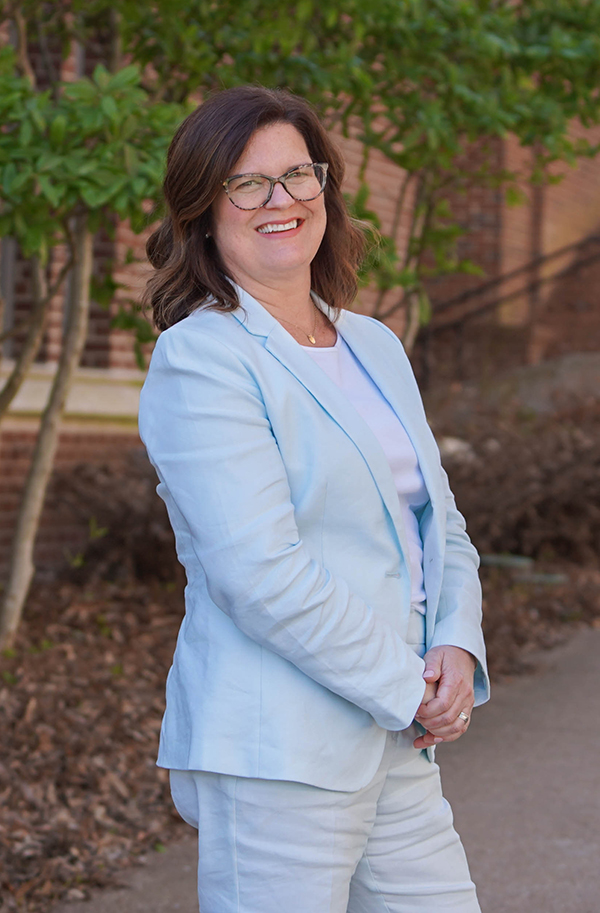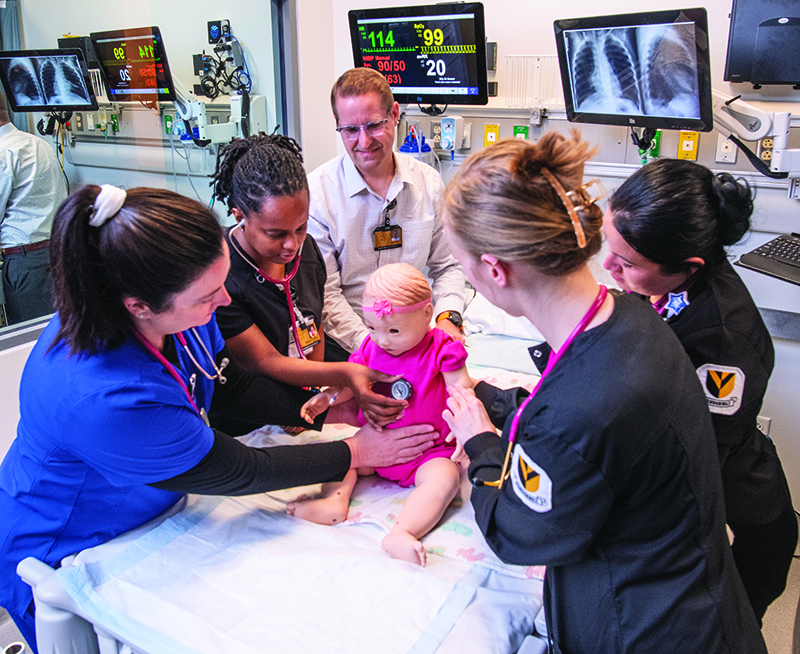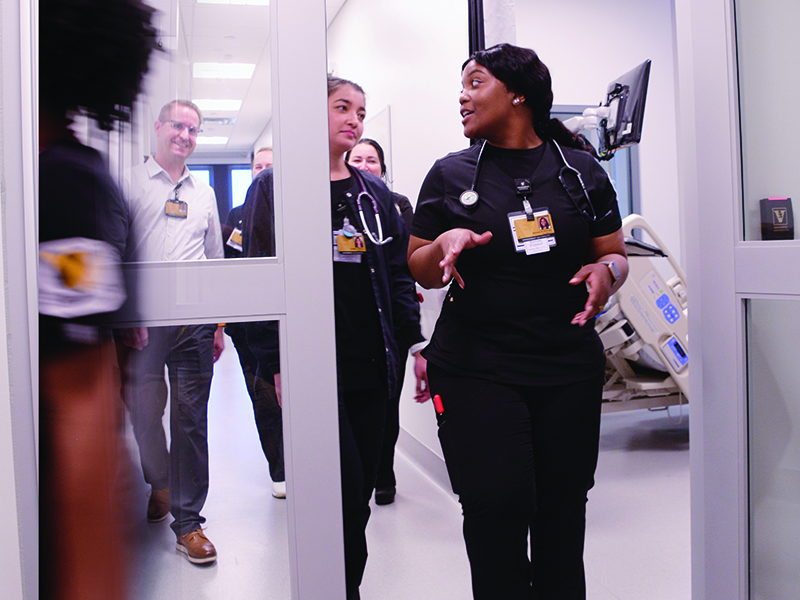The nursing profession is on the cusp of a transformation. The high demand for nurses directly aligns with all-time highs in the increased demand for health care. A compassionate, qualified and diverse workforce must be at the heart of the U.S. health care system.
The U.S. Bureau of Labor Statistics projects that more than 200,000 job openings will be available for nurses each year through 2031. Employment opportunities will grow by at least six percent during this time.
As the demand for nurses in the United States intensifies, there will be unique opportunities in the face of the changing health care landscape. Vanderbilt University School of Nursing is prepared for those opportunities and has taken its first steps toward them.
Reimagining Registered Nursing
The School of Nursing launched a master’s-level registered nursing program, the master of nursing, in 2022, with the first class beginning in January 2023. VUSN Dean Pamela R. Jeffries, PhD, FAAN, ANEF, FSSH, says that designing and developing the MN program was
a priority in response to the severe
nursing shortage.
“Our nation—and our very own Nashville and Vanderbilt—needs nurses. There is a severe nursing shortage, particularly for registered nurses,” says Jeffries, the Valere Potter Distinguished Professor of Nursing. “Vanderbilt had a baccalaureate program that closed in 1984 as we saw increased demand for nurse practitioners. We currently have 14 advanced practice nursing specialties, but there remains a need for generalist nurses even though Tennessee has many traditional baccalaureate and associate degree programs. We all thought—faculty and leadership—the best way to address the need for registered nurses was to create an MN program.”
Known internationally for its excellence in education, practice and research, VUSN has long offered students with non-nursing bachelor’s degrees the opportunity to become nurse practitioners, nurse-midwives and other advanced practice nurses. With the addition of the master of nursing degree, the school is now giving these career changers the opportunity to become master’s-prepared registered nurses. In four semesters, students looking to start a nursing career will have the clinical skills and knowledge required of registered nurses and be able to provide patient care in a variety of settings after passing the NCLEX.
According to Mary Ann Jessee, PhD, MSN’95, assistant dean for academics, generalist nursing practice, “Traditional MSN programs prepare students as advanced practice nurses while the MN is an entry-to-practice nursing degree,” she says. “Our MN graduates will be prepared as registered nurses with advanced knowledge, skills and experiences in health justice, nursing leadership, interprofessional teamwork and nursing informatics, as well as introductory clinical teaching competencies.”
The MN’s integrated, clinically-focused, accelerated curriculum consists of 65 credit hours and 1,300 clinical hours across multiple spheres of care and with patients of all ages and within multiple populations.
Vanderbilt’s MN graduates will contribute to holistic care as registered nurses in various health care settings, including hospitals, public health, community settings, long-term care and home health.
The need for these new RNs isn’t recent. Beginning in the 1970s and again in the 1990s, nursing experts, health systems leaders, researchers, federal officials and nursing academics have all identified an ongoing nursing shortage.
From Baby Boom to COVID Burnout
By 2030, about 73 million baby boomers born shortly after World War II will be 65 years or older. As the population ages, there is an increased need for health services. According to the Centers for Disease Control and Prevention, 4 in 10 adults in the
United States have more than one chronic disease.
Intertwined with the overall aging population is the fact that some of those baby boomers are nurses reaching retirement age. By 2030, an estimated 640,000 baby boom nurses are expected to retire. These experienced baby boomer nurses are leaving their roles as bedside nurses, educators and administrators. The retirement surge affects not only the number of nurses left but the loss of an intellectual asset, affecting the quality of care and patient satisfaction.
The matter of simply educating more nurses is complicated. In 2021, nursing programs had to turn away more than 91,000 qualified applicants due to a lack of nurse educators, opportunities for clinical training sites and resources.
Nursing schools, foundations, government, corporations and professional associations like the American Association of Colleges of Nursing have developed programs to try to increase the volume of nursing faculty, but the faculty workforce
grows slowly.
A new concern about the nursing workforce emerged in 2020 with the COVID-19 pandemic. The global emergency was the start of a crisis of unprecedented scale and scope, and even nurses not providing direct COVID-related care were under pressure. More recently, the U.S. has seen a newly coined term—“tripledemic”—used to describe the colliding surge of three major respiratory illnesses: COVID-19, respiratory syncytial virus (RSV) and the flu. This surge has again overwhelmed the hospital systems.
Three years in pandemic settings has taken its toll on some nurses who report burnout and a desire to leave the profession. Nurse burnout is the state of mental, physical and emotional exhaustion due to work-related stressors, such as long work hours, ongoing pressure to make quick decisions and the strain of caring for patients.
As nurses face these compounding factors, they can become disengaged and detached. Nurses put themselves at risk of developing depression or other mental health conditions. In the past two years, countless nurses have left the workforce or dramatically scaled back on their professional obligations to focus on other personal commitments.
All these challenges led to VUSN’s desire to help add more registered nurses to the current nursing workforce. The school’s graduate nursing education experience and faculty expertise meant that developing the new program as a master’s level RN was the natural progression.
Preparing the New Generation of RNs
“One of my favorite aspects of the MN program is that, like the PreSpecialty level of the MSN program, it provides people the opportunity to enter this wonderful profession of ours,” Jeffries says. “I was lucky to know from an early age that I wanted to be a nurse, but I also know scores of talented adults who came to that knowledge later in life and sometimes after they’d already had one career. When you talk with our current MN students, you hear their stories and know that their past degrees and careers will enhance their work in patient care.”
MN student Alicja Lanfear has a PhD in forensic anthropology and has been a researcher and professor. Working at VUMC led her to nursing. She says that her background prepared her well to take on the nursing process. Her intuition is to question, prompt, and seek reasoning—all essential components of critical thinking in nursing.
The best part, Lanfear says, is seeing how much nursing jives with her personality. “In using the critical thinking, knowledge base and skills, and then also bringing in my empathy—that’s the holistic nursing practice I want,” she says. “I sit there in class, happy as a clam, and realize ‘this is exactly my thought process.’”
With more than 100 years of nursing education and care, the School of Nursing has long incorporated what are now known as social determinants of health into its education, research and practices. Today, addressing the various factors that influence health, such as economic stability, access to education, health care access and quality, environment and social context are top of mind for many in health care. As highlighted in the Future of Nursing 2020-2030 National Academies of Health report, nurses are well-positioned to identify needs and resources related to SDOH across an increasingly diverse population with its own complex needs. “The MN program is based around the health equity framework, and we are preparing the students in the MN program to transition into holistic practice,” Jeffries says.
MN student Sarah Patton has a specific interest in underserved populations and has experience in research into HIV/AIDS prevalence and other health issues within the Latinx population. “Through applying and looking more deeply into what it means to be a nurse, nursing resonated with me. For the first time, I felt like, ‘ok, this is what I should be doing,’” Patton says. “Especially at Vanderbilt and their emphasis on health equity and holistic approach—I appreciate that element that plays into my background in public health.”
In using the critical thinking, knowledge base, and skills, and then also bringing in my empathy—that’s the holistic nursing practice I want.”—Alicja Lanfear
Lanfear says, “I love this curriculum because we start right out the gate with all of it. The entire program is blended throughout all our curricular activities. The battle is big, but we have to start small.”
The master of nursing program also gives students additional insight when deciding if—and which—advanced practice nursing appeals to them. Students experience a fast-paced learning environment that allows easy transitions toward further certifications like MSN, DNP or PhD programs, should they want them.
Jessee says that the leadership and education aspects of the new MN program mean that some graduates will have advanced opportunities. “We anticipate that they will foster swift upward mobility of our graduates into leadership or educator roles essential for the continued reduction of the shortage of both registered nurses and nursing faculty,” she says.
Several students note that they like the options the program provides. Some say they want to work as RNs before they decide if they want to move into advanced practice as nurse practitioners, administrators, nurse-midwives, informaticists or educators. Others plan to apply for additional education programs even as they begin their RN careers.
Master of nursing students say that was one element of the new program that appealed to them. Not only will the MN allow them to work as RNs in only four semesters, it will also give them a head start on other Vanderbilt degrees. Vanderbilt has deliberately structured its new MN to support further education, should a graduate wish it. Credits from the MN program will transfer to Vanderbilt’s doctor of nursing practice degree program.
On the Horizon
Jeffries is enthusiastic about other innovative efforts furthering the school’s MN program, health equity and nursing education.

Vanderbilt University Medical Center has announced a program that would provide funding to VUSN MN students, with the expectation of offering those students employment at VUMC after graduation and licensure.
While the School of Nursing has long incorporated social determinants of health and health equity into its curriculum, the dean expects to see the school take a more prominent role in the near future. Jeffries anticipates increasing research faculty, scholarship and educational components as VUSN researchers, faculty and students contribute to and engage in projects that address health inequities and issues of health justice.
The school is also launching professional development opportunities for nurses and other health care professionals. After surveying approximately 12,000 alums and health care organization leaders on proposed topics of interest, VUSN faculty experts are developing short courses between 10-15 hours long that can be used for continuing education credits, as well as a way to showcase one’s achievements. These short courses will be developed and delivered in what is called a micro-credential (short courses that demonstrate competencies in a certain area) and visualized with a badge. A micro-credential would be earned by demonstrating competency in a specific area; nurses would also earn continuing education credit (CEs).
“Vanderbilt School of Nursing has a rich history of innovation and reshaping itself in ways to meet the needs of its students, communities, health care and health care systems,” Jeffries says. “There are exciting times ahead.”

